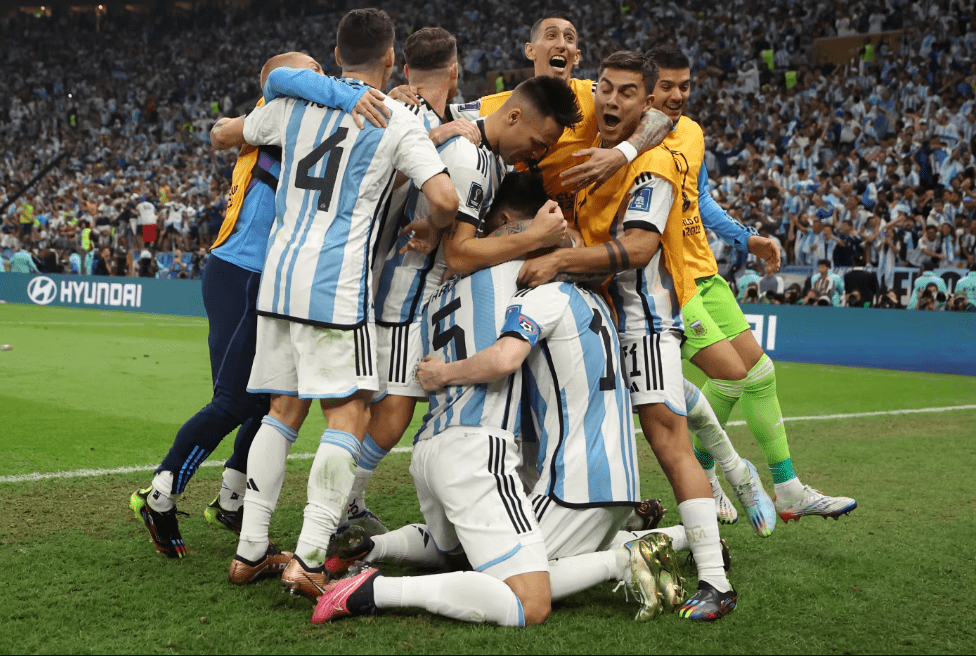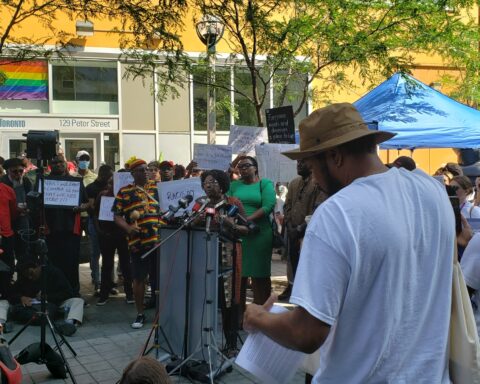I haven’t watched every FIFA World Cup but there’s little doubt in my mind that the 2022 iteration of the tournament in Qatar was the best and most memorable ever. There were a number of historic moments throughout the 28 days, including a record-setting 172 goals scored (many of them spectacular); unprecedented wins; late drama; and a climax that couldn’t have been scripted better.
Teammates at club level, Kylian Mbappe and Lionel Messi, sat tied on five goals after leading France and Argentina, respectively, to the final. Messi bagged a brace and the 23-year-old Frenchman responded with a hat trick (only the second ever in finals history). The game finished 3-3 after extra time, sending the teams to a nerve-wracking penalty shootout.
Argentina won the match, claiming their third World Cup title, denying France the chance to become the first team to win back-to-back World Cups since Pele’s Brazil in 1962.
The highlight of the tournament was unquestionably witnessing Messi, a man who’s dominated soccer for the last 15 years and who must now be considered the best player of all time, (second best depending on your bias) lift the biggest prize in sport.
But as Messi and Argentina fans celebrated the crowning achievement, the dark cloud that’s shrouded so much of the tournament in Qatar returned, threatening to overshadow the magic.
I’m not talking about the bisht, but the racism, imperialism and islamophobia that came out of the commentary on it. The same sentiments which have tainted the coverage of the 2022 tournament.
Western media bias
A bisht is a long, traditional cloak that symbolizes appreciation and respect in Arab cultures. It’s sometimes given to warriors after a triumphant battle. The garment is typically worn by politicians, sheikhs, and high-ranking officials — like the captain of a World Cup-winning squad. Messi was given the bisht by the emir of Qatar, Sheikh Tamim bin Hamad Al Thani, to wear before receiving the trophy.
I didn’t know any of this when I saw it initially, but I had the privilege of having a Jordanian explain it to me as we watched — and she explained it to me the same way I explained what a tactical foul is to her.
This is the first World Cup held in an Arab country, so receiving a ceremonial Arab garment at that moment makes sense. Soccer players wearing bishts at events held in Arab countries isn’t new nor is the giving of cultural or ceremonial items to winning athletes by host nations.
Football legends wearing the bisht: Zinedine Zidane (Kuwait 2015), Kaka (Kuwait 2018), Lionel Messi (Qatar 2022). pic.twitter.com/MvS9lR0bAk
— Abdulaziz Al Mesbah | عبدالعزيز المسباح (@AbdulazizMesbah) December 19, 2022
Pelé wears Mexican Sombrero after 1970 World Cup
•Media:¯\_(ツ)_/¯Olympians wear Greek Laurel Wreath at 2004 Olympics
•Media:¯\_(ツ)_/¯All podium winners in Russia F1 wear Russian Ushanka
•Media:¯\_(ツ)_/¯Messi wears Arab Bisht after 2022 World Cup
•Media: Outrageous!🤬 pic.twitter.com/DxvRZ6sSrl— Qasim Rashid, Esq. (@QasimRashid) December 19, 2022
This time, some journalists responded to their ignorance with criticism rather than curiosity. Journalists from western media outlets have dismissively referred to the bisht as a cape and called it “weird.” Worse, some said that the cloak’s presence at the trophy ceremony was “a shame”, “a bizarre act” and that it “crashed”, “ruined” or “hijacked” what should have been Messi’s moment.
I can understand the argument that the cloak obscures the famous blue and white stripes of the Argentina jersey and that images of the World Cup winning squad are iconic, but there are two issues with that argument. First, there are tons of brilliant images of Messi celebrating the win without the bisht. Second but more importantly — as far as I can tell Messi consented to wearing it. It wasn’t “imposed” on him as some have suggested.
Placing a bisht around somebody is a great display of honor. It’s intended for royalty, and Messi was crowned World Cup champion.
Think: British monarchy honoring somebody with knighthood.
But, western media pundits only see Qatar and Islam through eyes of ignorance. pic.twitter.com/kMfmCWBJMS
— Khaled Beydoun (@KhaledBeydoun) December 19, 2022
The notion that Messi was forced to wear the bisht, and the specific use of words like “hijacked” have obvious, ugly islamophobic connotations. As many people have pointed out, that’s been the case for much of the criticisms around this World Cup. Even when discussing the very real concerns about Qatar’s treatment of migrant workers and the LGBGTQ community, there’s an unshakeable tone of racism and colonialism.
“From here in Qatar the tournament bears no resemblance to all the doom-mongering headlines back home.”
Piers Morgan describes his experience of being in Doha, Qatar during the World Cup.@piersmorgan | @TalkTV | #PMUQatar pic.twitter.com/2WIvNJ4Yak
— Piers Morgan Uncensored (@PiersUncensored) November 28, 2022
Colony vs colonizer
The controversy over the bisht isn’t the only time colonialism was in the spotlight at the World Cup. Colonialism was at the heart of some of the most compelling narratives of the tournament as colonies faced off against their former colonizers. We saw England take on Wales and the United States, Tunisia play France, Costa Rica face Spain but the spirit of colony vs colonizers arc was best embodied by Morocco.
Morocco became the first African and first Arab nation to reach the semi-finals of a World Cup in the 92 years of the competition. The Atlas Lions’ historic showing in Qatar included defeating former colonial power Belgium and beating its former colonizers, Spain and Portugal, on the way to a semi-final showdown with France — the country that ruled it for nearly 45 years.
Africans, Arabs, Black people and neutrals who fell in love with the team from around the world were rooting for Morocco. You could almost hear it in the commentary and feel it in the way people supported Morocco that this was deeper than a regular dark horse or underdog story.
Beating a former colonizer goes beyond the sporting merits of the individual game; it’s rooted in painful history. It’s not about revenge in the sense of wanting to inflict pain — it’s more about pride, comeuppance, and proving to colonizers that they’re not better than you.
Argentina’s World Cup-winning captain, Roberto Perfumo, summed it up perfectly.
“In 1986, winning that game against England was enough,” he said. “Winning the World Cup was secondary for us. Beating England was our real aim.”
The two countries fought in The Falklands War four years before the tournament in Mexico, and they have more than 200 years of history. Apparently, Argentinians were more satisfied with the illegal “Hand of God” goal Diego Maradonna scored against England than they were with “The Goal of the Century” he scored minutes later.
France ended its protectorate of Morocco in 1956, so there are likely relatives of players from both teams who remember what life was like when Morocco was still a colony and what the fallout from that separation was like.
Black faces in white spaces
Another narrative layer that made Morocco’s performance at the World Cup so admirable is the fact that the players chose to play for Morocco. Some players with African roots choose to represent other countries, if eligible.
For example, brothers Nico and Inaki Williams were born in Spain to Ghanaian immigrants and were therefore able to play for either nation. Inaki chose to play for Ghana while Nico represents Spain. Morocco’s goalie, Yassine Bounou, was born in Montreal and could’ve played for Canada. And the Swiss player, Breel Embolo, who scored against Cameroon — the first time a player scored against the country of his birth.
Some players choose which country to play for based on where they feel the most at home. Others decide based on a real or perceived sporting advantage. Choosing to play for one country over another isn’t the same as renouncing one’s citizenship but it is often a thorny personal choice that leads to criticism. I’ve heard players who’ve switched allegiances be called traitors by their countrymen and been called frauds — or worse — by people in their adopted nations.
Once again, colonialism is at play. And not just in an internalized anti-Black racism or regular anti-Black racism, Eurocentrism sense.
Colonial powers like France and England benefited from hundreds of years of free labour (including military service), resource extraction, political interference, and immigration to enrich themselves at the expense of their former colonies. The instability caused by these atrocities has driven millions of people to migrate. There were 14 non-African teams at this World Cup featuring players with ties to the continent; France had the most with 15.
This feels especially poignant in the wake of Queen Elizabeth’s death earlier this year and the conversations it sparked.
When France played England in the quarter finals, the fruits of their colonial exploits were on full display. A third of England’s players and 58 per cent of the French players who took to the field were Black. That level of representation within the national teams of two of soccer’s powerhouses should be something a Black soccer player like myself can take pride in, but that would be naive.
Both England and France’s national men’s teams have recently brought their countries to the edge of glory in international soccer, with England making it to the finals of the European Championships against Italy last summer. Both teams lost in a penalty shootout. And the Black players who missed their spot kicks were racially abused by the team’s “supporters.”
Incidents like this are a reminder for Black and racialized people that our acceptance is conditional and can quickly be taken away when deemed appropriate. Even if you’re a citizen of a country, some people will always view and treat you as Other.
This is why while it’s exciting and beautiful for the Canadian men’s soccer to represent this country’s diversity so well, and I know it’ll inspire the next generation of Canada’s soccer stars, I’m nervous that the face of that team is a young, Black refugee, Alphonso Davies. Because I know how fast an adoring crowd can transform into an angry mob when you’re Black. Just ask Ben Johnson.
The Settler-Colonial 2026 World Cup
Colonialism will be front and centre in 2026 when settler colonial countries Canada, Mexico and the United States jointly host the World Cup. This should come as no surprise, soccer owes its spread and growth to two offshoots of colonialism: migration and the industrial revolution. But maybe we can use the World Cup to help heal some of the wounds left by colonization.
One of the critics of Messi donning the bisht accused Qatar of trying to impose itself on proceedings and called the move “grossly indulgent.” I think the North American World Cup should totally indulge in the varied culture of the continent. I would love to see the different languages, styles of dance, and regions represented in the opening ceremony. It would be fitting.
Also, I think giving the World Cup-winning captain a traditional Indigenous headdress or button blanket to wear when they go to lift the famous trophy would be epic. But as someone who’s neither Arab nor Indigenous, I can’t say how accurate a comparison this is. I also can’t speak on the appropriateness of the gestures, but my heart is in the right place.
If FIFA’s goal for the World Cup is to truly embrace soccer as the world’s game and spread it to every corner of the globe, gestures like these could be significant. All it takes is a few minutes to transform ignorance to curiosity to understanding. One of the beautiful things about living somewhere as diverse as Canada is that there’s so many opportunities for differences to be celebrated.
What if the tournament was more than just a sports event and was also a cultural and educational one? The eyes of the world will be on us and there’s a chance to make that count. So, when we welcome the world in three year’s time, let’s make the beautiful game live up to its name.
Marcus is a poet, editor and freelance journalist based in Toronto. He currently works with New Canadian Media as an Editor and as a Freelance Writer for ByBlacks.com, The Edge: A Leader's Magazine and The Soapbox Press.




